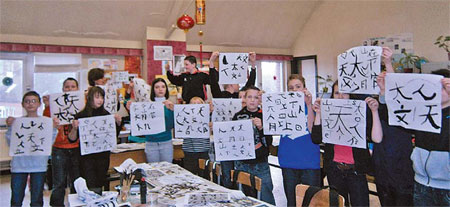A new word order
Updated: 2013-03-29 08:33
By Tuo Yannan (China Daily)
|
|||||||||||
|
Harchies Saint Francois primary school students displaying their calligraphy. Provided to China Daily |
Olaf Mertens, director of the 165-year-old French-speaking Institut de la Providence de Champion, added Chinese classes to the range of options at his middle school in 2011 in the hope that they will provide the children with a wider view of the world.
The school has 50 Chinese-language students, aged 12 to 15, and while the classes are not compulsory, many students have expressed a desire to learn the language and the school has received strong support from parents, he says.
Chinese teacher Chen Hsiu-yin, who began her career in 2000, visits the school once a week to teach a two-hour class, "I have received very positive feedback from the students, and they are all studying extremely hard," she says.
Another teacher in the city, Xie Xiaolin, taught English in East China's Zhejiang province before moving to Belgium in 1994. She began teaching Chinese in 2006.
"In recent years I have been much busier than before; every week I work four days, teaching four classes. From my own experience, I can see that the demand for Chinese has increased hugely," says Xie.
Androulla Vassiliou, European commissioner for education, culture, multilingualism, sport, media and youth, says she's proud of the commission's achievements in 2012 in terms of EU-China relations and confidently expects 2013 to be as conducive for fostering deeper, mutual understanding between the EU and the Chinese people.
Growing trend
The Woluwe European School in Brussels is a good example of the growing trend, she says.
It is part of Schola Europaea, or European Schools, an umbrella organization consisting of establishments that offer primary and secondary education and are located across seven countries.
The establishments, controlled jointly by the governments of EU member states, have more than 24,000 pupils, and the European Commission is a member of the board of governors.
The school has forged close links with its counterparts in China over the years, from introducing Chinese study in secondary schools to establishing a student exchange program with the Experimental School in Shanghai.
"I know that this school has very exciting plans to introduce courses in Mandarin and calligraphy, all taught by Chinese teachers," Vassiliou adds.
During Chinese New Year, the Mission of the People's Republic of China to the European Union held a celebration at the European School Brussels IV, a plush establishment whose buildings were part of a palace occupied by the Belgian royal family before being donated to the EU last year.
Brussels IV, also a part of Schola Europaea, is one of the group's four schools in Brussels. The majority of students are the children of officials and other EU employees, according to Kari Kivinen, secretary-general of Schola Europaea.
Kivinen says the celebrations for the Chinese New Year have been very enthusiastic. Demand was so high that all 800 places were filled in just two days.
"Chinese has been taught in our schools for several years already, because EU policy is to open up further to China, so parents are very keen for their children to learn the language," adds Kiniven.
During the Chinese Spring Festival, hundreds of elementary students - many of whom were dressed in traditional Chinese clothing such as Tang suits or qipao - and parents watched a performance of Chinese arts before participating in a range of traditional cultural activities, including making dumplings, the tea ceremony, calligraphy, folk music and tai chi.
Seven-year-old primary school student Louisa says she celebrated Chinese New Year along with her classmates. Her father was extremely keen to accompany his daughter and participate in the celebrations as a way of further encouraging Lousia's interest in the subject.
For Vassiliou, the increasing demand for Chinese is about looking forward to greater integration, deeper ties and a new direction for Europe.
"The Europe of tomorrow will not be inward-looking, focused on its own habits, languages and cultures. It will be a space increasingly open to exchanges with other peoples, a crossroads of multiple visions and values. I believe I can speak for our Chinese friends when I say that they share our vision of closer future relations based on mutual knowledge, respect and understanding."
tuoyannan@chinadaily.com.cn
Today's Top News
List of approved GM food clarified
ID checks for express deliveries in Guangdong
Govt to expand elderly care
University asks freshmen to sign suicide disclaimer
Tibet gears up for new climbing season
Media asked to promote Sino-Indian ties
Shots fired at Washington Navy Yard
Minimum growth rate set at 7%
Hot Topics
Lunar probe , China growth forecasts, Emission rules get tougher, China seen through 'colored lens', International board,
Editor's Picks

|

|

|

|

|

|






